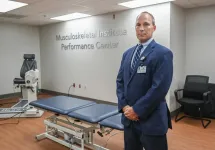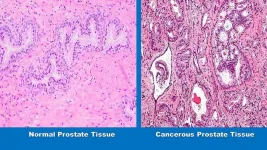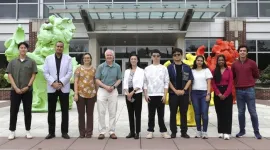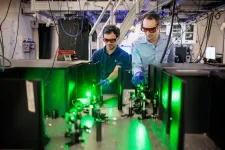(Press-News.org) SAN FRANCISCO—The question of what causes complex neurological diseases such as Alzheimer’s or multiple sclerosis continues to confound scientists and doctors, with the unknowns standing in the way of early diagnoses and effective treatments.
Even among identical twins who share the same genetic risk factors, one may develop a particular neurological disease while the other does not.
That’s because unlike diseases such as cystic fibrosis or sickle-cell anemia, which are caused by a single gene, most neurological disorders are associated with many—sometimes hundreds—of rare genetic variants. And on their own, these variants can’t predict who will develop disease, as neurological conditions are also strongly influenced by environmental factors and vascular risks such as high blood pressure, aging, heart disease, or obesity.
But there’s one often-overlooked thread that connects most neurological diseases, says Katerina Akassoglou, PhD, a senior investigator at Gladstone Institutes: They’re marked by a toxic immune reaction caused by blood that leaks into the brain through damaged blood vessels.
“Interactions between the brain, blood vessels, and the immune system are a common thread in the development and progression of many neurological diseases that have been traditionally viewed as very different conditions,” says Akassoglou, a senior investigator with the Gladstone Institute of Neurological Diseases and director of the Center for Neurovascular Brain Immunology at Gladstone and UC San Francisco. “Knowing that leaked blood is a key driver of brain inflammation, we can now approach these diseases from a different angle.”
She and her collaborators share their insights on this topic in a commentary article published in Cell’s 50th anniversary “Focus on Neuroscience” issue.
Neutralizing the Culprit
Akassoglou and her lab have long investigated how blood that leaks into the brain trigger neurologic diseases, essentially by hijacking the brain’s immune system and setting off a cascade of harmful often-irreversible effects that result in damaged neurons.
One blood protein in particular—fibrin, normally involved in blood coagulation—is responsible for setting off this detrimental cascade. The process has been observed in conditions as diverse as Alzheimer’s, traumatic brain injury, multiple sclerosis, premature birth, and even COVID-19. However, Akassoglou and her team found that the process could be prevented or interrupted by “neutralizing” fibrin to deactivate its toxic properties—an approach that appears to protect against many neurological diseases when tested in animal models.
“As a first step, we know that neutralizing fibrin reduces the burden posed by vascular dysfunction,” Akassoglou says. Regardless of what initially caused the blood leaks, be it a head injury, autoimmunity, genetic mutations, brain amyloid or infection, neutralizing fibrin appears to be protective in multiple animal models of disease.
The scientists previously developed a drug, a therapeutic monoclonal antibody, that specifically targets fibrin’s inflammatory properties without affecting its essential role in blood coagulation. This fibrin-targeting immunotherapy has shown, in mice, to protect from multiple sclerosis and Alzheimer’s, and to treat neurological effects of COVID-19. A humanized version of this first-in-class fibrin immunotherapy is already in Phase 1 safety clinical trials by Therini Bio, a biotech company launched to advance discoveries from Akassoglou’s lab.
A New Era of Brain Research
In the Cell commentary, Akassoglou and her colleagues make the case that seemingly disparate neurological diseases must be viewed differently in light of new research on the blood-brain-immune interface.
They say that in the coming decade, scientific breakthroughs will emerge from collaborative networks of immunologists, neuroscientists, hematologists, geneticists, computer scientists, physicists, bioengineers, drug developers, and clinical researchers. These partnerships—forged across academia, industry, and foundations—will catalyze innovation in drug discovery and transform medical practice for neurological diseases.
“This is a new opportunity for drug discovery that goes beyond addressing genes alone or environmental factors alone,” Akassoglou says. “To usher in this new era, we must leverage new technologies and embrace an interdisciplinary approach that accounts for the important roles of immune and vascular systems in neurodegeneration.”
About the Study
The commentary article, “Pioneering Discovery and Therapeutics at the Brain-Vascular-Immune Interface,” appears in the October 17 issue of Cell. Authors include Katerina Akassoglou, Dimitrios Davalos, Andrew Mendiola, Mark Petersen, Jae Kyu Ryu, Christian Schachtrup, and Zhaoqi Yan.
About Gladstone Institutes
Gladstone Institutes is an independent, nonprofit life science research organization that uses visionary science and technology to overcome disease. Established in 1979, it is located in the epicenter of biomedical and technological innovation, in the Mission Bay neighborhood of San Francisco. Gladstone has created a research model that disrupts how science is done, funds big ideas, and attracts the brightest minds.
END
A new era of treating neurological diseases at the blood-brain-immune interface
Scientists from Gladstone Institutes say it’s time to think differently about how to define and treat diseases such as Alzheimer’s and multiple sclerosis.
2024-10-17
ELSE PRESS RELEASES FROM THIS DATE:
Astronomers detect ancient lonely quasars with murky origins
2024-10-17
A quasar is the extremely bright core of a galaxy that hosts an active supermassive black hole at its center. As the black hole draws in surrounding gas and dust, it blasts out an enormous amount of energy, making quasars some of the brightest objects in the universe. Quasars have been observed as early as a few hundred million years after the Big Bang, and it’s been a mystery as to how these objects could have grown so bright and massive in such a short amount of cosmic time.
Scientists have proposed that the earliest quasars sprang from overly dense ...
New study highlights the dangers of handheld cellphone use among teen drivers
2024-10-17
PHILADELPHIA (October 17, 2024) – A new study, conducted by a group of researchers led by Penn Nursing and Perelman School of Medicine and funded by the Centers for Disease Control, found a strong association between handheld cellphone use and risky driving behaviors among newly licensed teen drivers. The study, published online first in JAMA Open, used a smartphone telematics application to track the driving habits of hundreds of teens and identify potential safety risks.
The investigation found that teens who used their cellphones while driving were significantly more likely to engage in risky driving behaviors, such as hard braking and rapid acceleration. These behaviors can ...
Part of the GBHSH community in Spain uses doxycycline to prevent sexually transmitted diseases
2024-10-17
The increasing incidence of sexually transmitted bacterial infections (STIs) is a major public health problem worldwide. Currently, among the therapies being studied is the use of the antibiotic doxycycline as a method of post-exposure prophylaxis after unprotected sex — known as DoxyPEP. Now, the University of Barcelona and the NGO Stop have carried out the first study in Spain on the use of DoxyPEP as a preventive strategy among the gay, bisexual and other men who have sex with men (GBHSH) community in Spain.
“The results suggest that, although medical and scientific associations rarely endorse the community use of DoxyPEP as a prevention strategy, ...
Researchers at Wake Forest University School of Medicine receive $4.5 million grant from Department of Defense to study neck injuries
2024-10-17
CHARLOTTE, N.C. – Oct. 17, 2024 – Researchers at Wake Forest University School of Medicine have received a three-year, $4.5 million grant from the Department of Defense to study cervical spine injuries in military personnel.
Musculoskeletal injuries, such as those that occur to the cervical spine (neck), are problematic for military personnel. This is especially true for military personnel who must perform missions in demanding environments with head-supported mass. This head-supported mass includes the baseline protective helmet, communications, specialized night vision technology and other attachments.
“These injuries can lead to a significant number of lost-duty ...
Study suggests a healthy diet may help keep low grade prostate cancer from progressing to more dangerous states during active surveillance
2024-10-17
In a peer-reviewed study believed to be the first of its kind published, a research team led by Johns Hopkins Medicine provides scientific evidence that a healthy diet may reduce the chance of low risk prostate cancer progressing to a more aggressive state in men undergoing active surveillance — a clinical option in which men with lower risk cancer are carefully monitored for progression in lieu of treatments that could have undesired side effects or complications.
The findings are reported today in the journal JAMA Oncology.
“Many men diagnosed with low grade prostate cancer are interested in changes they can ...
Center for Genomic Diagnostics receives first USDA grant
2024-10-17
Foreign animal diseases are a global threat to swine production with the potential for detrimental economic implications. Recently, researchers at the University of Illinois Urbana-Champaign received a three-year grant of $650,000 from the U.S. Department of Agriculture to develop sensitive, rapid, low-cost, and portable point-of-use biosensors to improve on-farm detection and surveillance of African swine fever virus.
ASFV is a large DNA virus that infects swine and can result in a lethal hemorrhagic fever, spread rapidly to neighboring pigs, and cause excessive morbidity ...
The National Tax Journal is pleased to announce the recipients of the 2024 Musgrave Prize and the 2024 Referee Award
2024-10-17
The National Tax Journal is pleased to announce the recipients of the 2024 Musgrave Prize and the 2024 Referee Award.
The Richard A. Musgrave Prize was created in 1999 and is presented each year to the author(s) of the best article published in the National Tax Journal. The award is a tribute to Richard Musgrave, whose work throughout his luminous career was characterized by a powerful blend of analytical clarity, insight drawn from the historical record, and respect for the importance of administrative issues. With this award, the National Tax Association recognizes his many contributions to public policy theory, research, and practice.
This year, ...
Study finds legalization didn’t increase recreational cannabis use among young adults in country of Georgia
2024-10-17
(Boston)—Cannabis is one of the most widely used drugs, with an estimated 219 million users globally in 2021, with the highest number of users in the Americas. It is also the most used drug among young people. In the U.S., cannabis use among young adults (age 19 to 22) reached a historically high level in 2021, with 42.6% reporting use in the past year.
Effects and impact of recreational cannabis legalization and decriminalization on societies is a topic of global relevance and increasing scientific interest. Despite a rapidly growing body of published evidence, findings remain mostly ...
A.J. Drexel Autism Institute study highlights key challenges and opportunities in transitioning autistic individuals into adulthood
2024-10-17
The Autism Transitions Research Project, funded by the Health Resources and Services Administration and led by Drexel University’s A.J. Drexel Autism Institute, has released new findings that underscore critical challenges and opportunities in transitioning autistic youth into adulthood. As approximately 1.2 million autistic individuals are expected to reach adulthood in the coming decade, these insights are vital for shaping future research and services.
The study, “Challenges and Opportunities in Transitioning Autistic Individuals into Adulthood,” led by Anne M. Roux, a research scientist and director at the Policy Impact Project in the ...
Measuring defects to better understand quantum systems
2024-10-17
Quantum defects have the potential to act as ultra-sensitive sensors that could offer new kinds of navigation or biological sensor technology.
One type of these defect systems, nitrogen vacancy (NV) centers in diamonds, can measure nanoscale magnetic fields. But while scientists can control the quantum spin of these centers — single defects in the diamond, where nitrogen has replaced the carbon — they still do not have a full understanding of how to best isolate that spin from the spins of other defects in the material, which can destroy its quantum state memory, ...
LAST 30 PRESS RELEASES:
Does mental health affect mortality risk in adults with cancer?
EANM launches new award to accelerate alpha radioligand therapy research
Globe-trotting ancient ‘sea-salamander’ fossils rediscovered from Australia’s dawn of the Age of Dinosaurs
Roadmap for Europe’s biodiversity monitoring system
Novel camel antimicrobial peptides show promise against drug-resistant bacteria
Scientists discover why we know when to stop scratching an itch
A hidden reason inner ear cells die – and what it means for preventing hearing loss
Researchers discover how tuberculosis bacteria use a “stealth” mechanism to evade the immune system
New microscopy technique lets scientists see cells in unprecedented detail and color
Sometimes less is more: Scientists rethink how to pack medicine into tiny delivery capsules
Scientists build low-cost microscope to study living cells in zero gravity
The Biophysical Journal names Denis V. Titov the 2025 Paper of the Year-Early Career Investigator awardee
Scientists show how your body senses cold—and why menthol feels cool
Scientists deliver new molecule for getting DNA into cells
Study reveals insights about brain regions linked to OCD, informing potential treatments
Does ocean saltiness influence El Niño?
2026 Young Investigators: ONR celebrates new talent tackling warfighter challenges
Genetics help explain who gets the ‘telltale tingle’ from music, art and literature
Many Americans misunderstand medical aid in dying laws
Researchers publish landmark infectious disease study in ‘Science’
New NSF award supports innovative role-playing game approach to strengthening research security in academia
Kumar named to ACMA Emerging Leaders Program for 2026
AI language models could transform aquatic environmental risk assessment
New isotope tools reveal hidden pathways reshaping the global nitrogen cycle
Study reveals how antibiotic structure controls removal from water using biochar
Why chronic pain lasts longer in women: Immune cells offer clues
Toxic exposure creates epigenetic disease risk over 20 generations
More time spent on social media linked to steroid use intentions among boys and men
New study suggests a “kick it while it’s down” approach to cancer treatment could improve cure rates
Milken Institute, Ann Theodore Foundation launch new grant to support clinical trial for potential sarcoidosis treatment
[Press-News.org] A new era of treating neurological diseases at the blood-brain-immune interfaceScientists from Gladstone Institutes say it’s time to think differently about how to define and treat diseases such as Alzheimer’s and multiple sclerosis.








